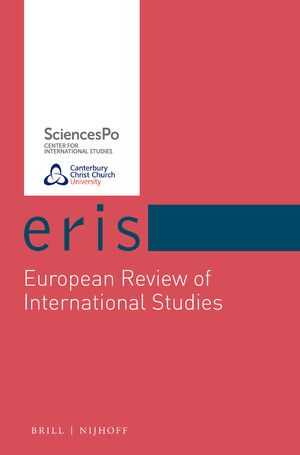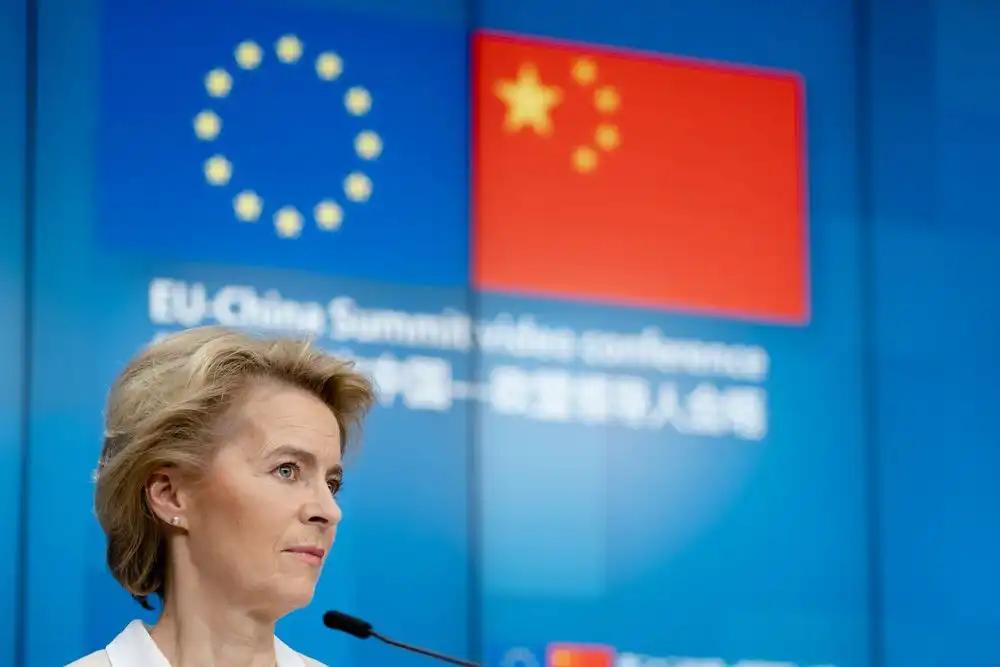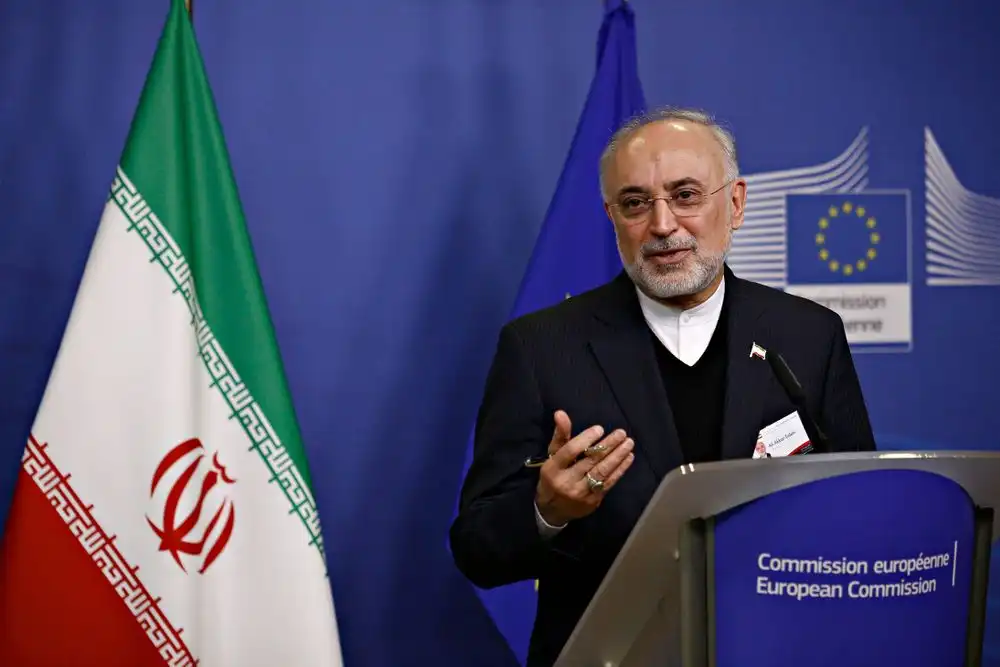Home>The EU as a Global Peace and Security Actor in Turbulent Times.

04.01.2022
The EU as a Global Peace and Security Actor in Turbulent Times.
Interview with Andreas Grimmel and Julia Strasheim (ERIS)
The latest special issue of the European Review of International Studies (ERIS) has just come out. The various contributions explore the role of the EU as a global peace and security actor in turbulent times. The guest editors, Andreas Grimmel and Julia Strasheim have gathered authors representing both European studies and peace and conflict research. An interview by L�éonard Colomba-Petteng.
In your introduction to the special issue , you identify two major shortcomings in the literature: the EU-centric character of research on the Union’s foreign policy, on the one hand, and the lack of interdisciplinary debate between peace and conflict research and European studies, on the other hand. How does this special issue fill these gaps?
The “navel-gazing” character of research on the EU’s foreign policy means that studies tend to focus on how decisions are reached in European institutions or in the member states and not on how these decisions and the resulting policies are implemented and perceived in the receiving countries of the Union’s foreign policy, such as in post-conflict societies. This is problematic from both a theoretical and a practical perspective, since peace and conflict research has shown for years that the legitimacy of certain policies to enhance peace and security among the local population and political elites in receiving countries is one of the most important criteria for the success of these policies. Our special issue therefore furthers the interdisciplinary debate between authors representing peace and conflict research and European studies in order to fully seize the explanatory potential of both disciplines and address this shortcoming. Almost all articles that make up this special issue of ERIS analyse EU foreign policy actions from the perspective of the various “theatres of engagement” the EU is active in, from Nepal to Southeast Asia to the Sahel. Furthermore, almost all articles come with novel empirical insights from carrying out in-depth interviews and fieldwork to address this shortcoming.
The special issue provides two original and complementary contributions focusing on China. What have been the major evolutions in the EU’s approach towards China?

The relations between the EU and China are very close. This is true at least in light of the strong trade links. The European Union, however, pursues a clearly different political course than China does. This is, first and foremost, due to the fact that the European Union is not a single state. Also, the differences in the political system play a decisive role here together with the EU’s emphasis on multilateralism, rule of law and institution building. Against this background, it is interesting to note that the European Union has so far not been able to find a clear position vis-à-vis China and its bilateral—and at the same time rather pragmatic—approach.
The EU’s neglect towards the 16+1 Platform, which is to be seen in the wider context of China’s Belt and Road Initiative as a vehicle of its world political ambitions and in which a whole series of EU member states also participate, is emblematic of this disunity within the EU. Although there have been repeated declarations and strategy papers formulated by the EU, such as the new 2021 EU-China Strategy, stating values, principles and interests that are to be represented vis-à-vis China, these have ultimately failed because member states of the European Union often feel bound by them to a limited extent and regularly also seek bilateral solutions with China. This often contradicts the EU’s position. Ultimately, therefore, it will very much depend on whether the European Union (and all of its members) succeed(s) in speaking with one voice and clearly formulating and articulating its own preferences vis-à-vis China in the coming years.
The case study on the Sahel develops the concept of “foreign policy entrapment”. What are the factors leading to entrapment and are there ways, for the EU, to avoid it?
The study by Julian Bergmann and Friedrich Plank in our special issue analyses how path dependencies and lock-in effects have shaped the EU’s agenda in the Sahel, which has in recent years developed into one of the key areas of the EU’s efforts to promote peace and security in Africa. They build on insights from historical institutionalism in order to develop the concept of “foreign policy entrapment”, which they then use to account for the long-term implications that result from early-on decisions on the direction of EU foreign policy. They identify several factors leading to “foreign policy entrapment” and to making it difficult for EU foreign policymakers to change any policies put forward. Generally speaking, initial decisions to develop an EU policy create path dependencies that set the EU on a certain track of action. Then, lock-in effects reinforce and accelerate the direction of this policy and make alternatives implausible. With regard to the EU’s Sahel policy, Julian Bergmann and Friedrich Plank argue that these lock-in effects are advanced by two factors in particular: EU-internal drivers, such as inter-institutional compétition; and EU-external drivers, such as external actors that the EU regularly interacts with and that shape specific initiatives. But in the Sahel, the EU foreign policy agenda has thus far failed to produce the desired outcomes.
So if we want to think about how to avoid entrapment, it is important to understand, as Julian Bergmann and Friedrich Plank remind us, that any argument about entrapment is not a deterministic one in the sense that once a certain path is chosen, no alternative is possible: the extent to which path dependencies actually play out depends on the strength of both EU-internal and external factors that drive lock-in effects.
One contribution discusses the concept of “strategic autonomy”. Would you consider that the unravelling transatlantic relationship under President Trump turned out to be somehow beneficial to the autonomy of the Common Foreign and Security Policy?

Indeed, Sascha Lohmann’s contribution on the concept of European strategic autonomy in our special issue sets out by arguing that the unravelling transatlantic relationship under President Trump—the “America First” policies put forward by his administration—as well as the retrenchment of the United States from multilateral institutions represented one of the greatest challenges to the ideal of the EU being not only capable of safeguarding its own security, but also being able to promote peace and security in the world. This development was certainly matched in Brussels and the member states with a reaffirmation of commitments to increase European strategic autonomy. Sascha Lohmann quotes, for instance, from the famous Sorbonne speech by French President Emmanuel Macron, in which he declared the need for enhanced European sovereignty due to the “gradual and inevitable disengagement by the United States”.
At the same time, by using the case of Iran and analyzing the clash between the EU and the US in ensuring the peacefulness of the Iranian nuclear program, Sascha Lohmann also points to the limits to enhancing European autonomy beyond these declarations. He argues for instance that a coherent understanding about what European strategic autonomy could actually mean has yet to emerge and that thus far, in striving toward this ideal of autonomy, not least since the unravelling transatlantic relationship under President Trump, European foreign policymakers are confronted with the harsh reality of lacking the necessary means to carry it out. The “somber conclusion” he draws is therefore that the case of Iran has shown that much needs to be done to achieve European strategic autonomy and its ability to act independently of the United States in the field of economics or security.
As you mentioned it clearly, the challenges which fundamentally alter the context in which the EU supports peace and security also include EU-internal dynamics. What are these dynamics and how exactly do they impact EU foreign policy?
The area of the European Union’s Common Foreign and Security Policy is still very much characterised by the principle of unanimity. This means that, as a rule, all 27 member states must agree when it comes to clarifying issues that concern joint action in the area of peace and security. Admittedly, over the years more and more issues have been made accessible to joint decision making and corresponding institutions such as the European External Action Service (EEAS) have been created, which enable the EU to act more effectively and efficiently in this area. When we speak of EU-internal dynamics, however, we actually mostly mean the internal dynamics of the member states, which to a large extent determine the external action of the EU. The promotion of peace and security by the EU depends crucially on whether the EU is able to find and promote a coherent position and on whether it is perceived as a reliable partner. It is precisely this point, however, that one must rather attest to a general weakness of the EU, which, conversely, can only mean that there is great potential for improvement here!
Andreas Grimmel is Associate Researcher and Lecturer at the Faculty of Business, Economics and Social Sciences of the University of Hamburg, and Research Director of the Europa-Kolleg Hamburg – Institute for European Integration.
Julia Strasheim is Deputy Managing Director at the Bundeskanzler-Helmut-Schmidt-Stiftung and Research Associate at the German Institute of Global and Area Studies (GIGA).
Léonard Colomba-Petteng is a PhD student at CERI Sciences Po, under the supervision of Prof. Christian Lequesne.
Read the introduction to the special issue, by Andreas Grimmel and Julia Strasheim
(credits: Brill)
Follow us
Contact us
Media Contact
Coralie Meyer
Phone : +33 (0)1 58 71 70 85
coralie.meyer@sciencespo.fr
Corinne Deloy
Phone : +33 (0)1 58 71 70 68
corinne.deloy@sciencespo.fr
